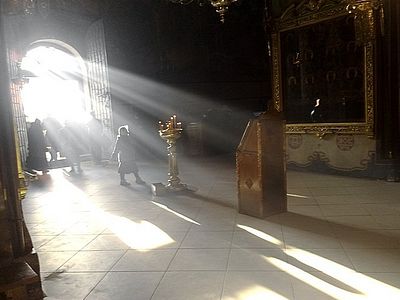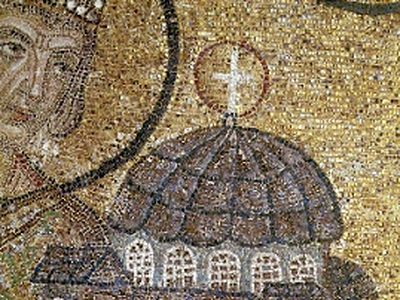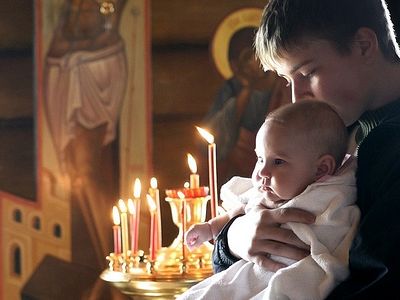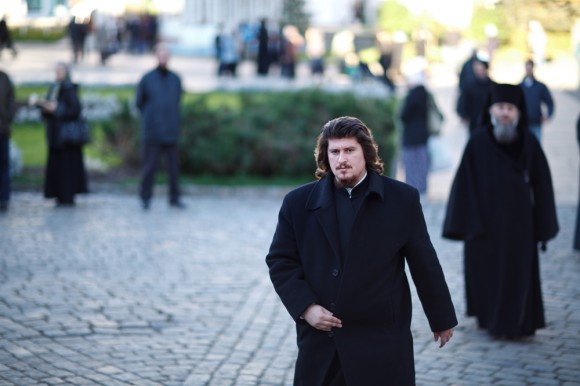 Photo by MPDA.ru
Photo by MPDA.ru
Rather than guess why this is, I emailed a hundred Orthodox men, most of whom joined the Church as adults. What do they think makes this church particularly attractive to men? Their responses, below, may spark some ideas for leaders in other churches, who are looking for ways to keep guys in the church.
Challenges. The term most commonly cited by these men was "challenging." Orthodoxy is "active and not passive." "It's the only church where you are required to adapt to it, rather than it adapting to you." "The longer you are in it, the more you realize it demands of you."
The "sheer physicality of Orthodox worship" is part of the appeal. Regular days of fasting from meat and dairy, "standing for hours on end, performing prostrations, going without food and water [before communion]...When you get to the end you feel that you've faced down a challenge." "Orthodoxy appeals to a man's desire for self-mastery through discipline."
"In Orthodoxy, the theme of spiritual warfare is ubiquitous; saints, including female saints, are warriors. Warfare requires courage, fortitude, and heroism. We are called to be 'strugglers' against sin, to be 'athletes' as St. Paul says. And the prize is given to the victor. The fact that you must 'struggle' during worship by standing up throughout long services is itself a challenge men are willing to take up."
A recent convert summed up, "Orthodoxy is serious. It is difficult. It is demanding. It is about mercy, but it's also about overcoming oneself. I am challenged in a deep way, not to 'feel good about myself' but to become holy. It is rigorous, and in that rigor I find liberation. And you know, so does my wife."
Clear Disciplines. Several mentioned that they really appreciated having clarity about the content of these challenges and what they were supposed to do. "Most guys feel a lot more comfortable when they know what's expected of them." "Orthodoxy presents a reasonable set of boundaries." "It's easier for guys to express themselves in worship if there are guidelines about how it's supposed to work—especially when those guidelines are so simple and down-to-earth that you can just set out and start doing something."
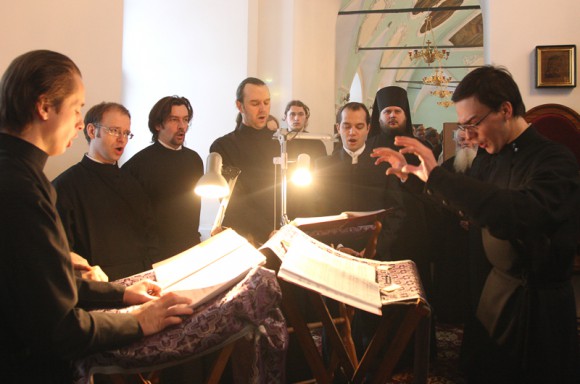 Male choir, seminarians.
Male choir, seminarians.
They appreciate learning clear-cut physical actions that are expected to form character and understanding. "People begin learning immediately through ritual and symbolism, for example, by making the sign of the cross. This regimen of discipline makes one mindful of one's relation to the Trinity, to the Church, and to everyone he meets."
A Goal. Men also appreciate that this challenge has a goal: union with God. One said that in a previous church "I didn't feel I was getting anywhere in my spiritual life (or that there was anywhere to get to — I was already there, right?) But something, who knew what, was missing. Isn't there SOMETHING I should be doing, Lord?"
Orthodoxy preserves and transmits ancient Christian wisdom about how to progress toward this union, which is called "theosis." Every sacrament or spiritual exercise is designed to bring the person, body and soul, further into continual awareness of the presence of Christ within, and also within every other human being. As a cloth becomes saturated with dye by osmosis, we are saturated with God by theosis.
A catechumen wrote that he was finding icons helpful in resisting unwanted thoughts. "If you just close your eyes to some visual temptation, there are plenty of stored images to cause problems. But if you surround yourself with icons, you have a choice of whether to look at something tempting or something holy."
A priest writes, "Men need a challenge, a goal, perhaps an adventure — in primitive terms, a hunt. Western Christianity has lost the ascetic, that is, the athletic aspect of Christian life. This was the purpose of monasticism, which arose in the East largely as a men's movement. Women entered monastic life as well, and our ancient hymns still speak of women martyrs as showing 'manly courage.'"
"Orthodoxy emphasizes DOING. …. Guys are ACTIVITY oriented."
No Sentimentality. In "The Church Impotent," cited above (and recommended by several of these men), Leon Podles offers a theory about how Western Christian piety became feminized. In the 12th-13th centuries a particularly tender, even erotic, strain of devotion arose, one which invited the individual believer to picture himself or herself (rather than the Church as a whole) as the Bride of Christ. "Bridal Mysticism" was enthusiastically adopted by devout women, and left an enduring stamp on Western Christianity. It understandably had less appeal for guys. For centuries in the West, men who chose the ministry have been stereotyped as effeminate. A life-long Orthodox layman says that, from the outside, Western Christianity strikes him as "a love story written for women by women."
The Eastern Church escaped Bridal Mysticism because the great split between East and West had already taken place. The men who wrote me expressed hearty dislike for what they perceive as a soft Western Jesus. "American Christianity in the last two hundred years has been feminized. It presents Jesus as a friend, a lover, someone who 'walks with me and talks with me.' This is fine rapturous imagery for women who need a social life. Or it depicts Jesus whipped, dead on the cross. Neither is the type of Christ the typical male wants much to do with."
During worship, "men don't want to pray in the Western fashion with hands clasped, lips pressed together, and a facial expression of forced serenity." "It's guys holding hands with other guys and singing campfire songs." "Lines about 'reaching out for His embrace,' 'wanting to touch His face,' while being 'overwhelmed by the power of His love'—those are difficult songs for one man to sing to another Man."
"A friend of mine told me that the first thing he does when he walks into a church is to look at the curtains. That tells him who is making the decisions in that church, and the type of Christian they want to attract."
"Guys either want to be challenged to fight for a glorious and honorable cause, and get filthy dirty in the process, or to loaf in our recliners with plenty of beer, pizza, and football. But most churches want us to behave like orderly gentlemen, keeping our hands and mouths nice and clean."
One man said that worship at his Pentecostal church had been "largely an emotional experience. Feelings. Tears. Repeated rededication of one's life to Christ, in large emotional group settings. Singing emotional songs, swaying hands aloft. Even Scripture reading was supposed to produce an emotional experience. I am basically a do-er, I want to do things, and not talk about or emote my way through them! As a business person I knew that nothing in business comes without effort, energy, and investment. Why would the spiritual life be any different?"
Another, who visited Catholic churches, says, "They were conventional, easy, and modern, when my wife and I were looking for something traditional, hard, and counter-cultural, something ancient and martial." A catechumen says that at his non-denominational church "worship was shallow, haphazard, cobbled together from whatever was most current; sometimes we'd stand, sometimes we'd sit, without much rhyme or reason to it. I got to thinking about how a stronger grounding in tradition would help."
"It infuriated me on my last Ash Wednesday that the priest delivered a homily about how the real meaning of Lent is to learn to love ourselves more. It forced me to realize how completely sick I was of bourgeois, feel-good American Christianity."
A convert priest says that men are drawn to the dangerous element of Orthodoxy, which involves "the self-denial of a warrior, the terrifying risk of loving one's enemies, the unknown frontiers to which a commitment to humility might call us. Lose any of those dangerous qualities and we become the 'JoAnn Fabric Store' of churches: nice colors and a very subdued clientele."
"Men get pretty cynical when they sense someone's attempting to manipulate their emotions, especially when it's in the name of religion. They appreciate the objectivity of Orthodox worship. It's not aimed at prompting religious feelings but at performing an objective duty."
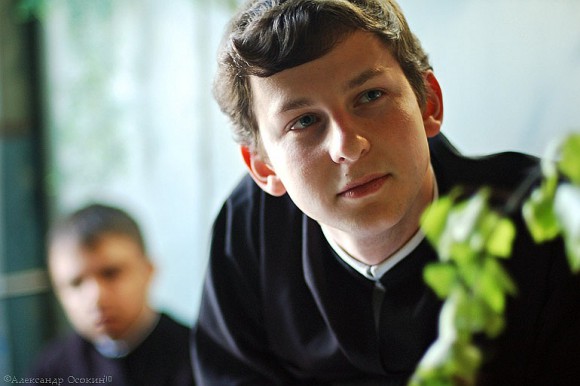 Photo by Alexander Osokin.
Photo by Alexander Osokin.
From a deacon: "Evangelical churches call men to be passive and nice (think 'Mr. Rogers'). Orthodox churches call men to be courageous and act (think 'Braveheart').
Jesus Christ. What draws men to Orthodoxy is not simply that it's challenging or mysterious. What draws them is the Lord Jesus Christ. He is the center of everything the Church does or says.
In contrast to some other churches, "Orthodoxy offers a robust Jesus" (and even a robust Virgin Mary, for that matter, hailed in one hymn as "our Captain, Queen of War"). Several used the term "martial" or referred to Orthodoxy as the "Marine Corps" of Christianity. (The warfare is against self-destructive sin and the unseen spiritual powers, not other people, of course.)
One contrasted this "robust" quality with "the feminized pictures of Jesus I grew up with. I've never had a male friend who would not have expended serious effort to avoid meeting someone who looked like that." Though drawn to Jesus Christ as a teen, "I felt ashamed of this attraction, as if it were something a red-blooded American boy shouldn't take that seriously, almost akin to playing with dolls."
A priest writes: "Christ in Orthodoxy is a militant, Jesus takes Hell captive. Orthodox Jesus came to cast fire on the earth. (Males can relate to this.) In Holy Baptism we pray for the newly-enlisted warriors of Christ, male and female, that they may 'be kept ever warriors invincible.'"
After several years in Orthodoxy, one man found a service of Christmas carols in a Protestant church "shocking, even appalling." Compared to the Orthodox hymns of Christ's Nativity, "'the little Lord Jesus asleep on the hay' has almost nothing to do with the Eternal Logos entering inexorably, silently yet heroically, into the fabric of created reality."
Continuity. Many intellectually-inclined Orthodox converts began by reading Church history and the early Christian writers, and found it increasingly compelling. Eventually they faced the question of which of the two most ancient churches, the Roman Catholic or the Orthodox, makes the most convincing claim of being the original Church of the Apostles.
A lifelong Orthodox says that what men like is "stability: Men find they can trust the Orthodox Church because of the consistent and continuous tradition of faith it has maintained over the centuries." A convert says, "The Orthodox Church offers what others do not: continuity with the first followers of Christ." This is continuity, not archeology; the early church still exists, and you can join it.
"What drew me was Christ's promises to the Church about the gates of hell not prevailing, and the Holy Spirit leading into all truth—and then seeing in Orthodoxy a unity of faith, worship, and doctrine with continuity throughout history."
Another word for continuity is "tradition." A catechumen writes that he had tried to learn everything necessary to interpret Scripture correctly, including ancient languages. "I expected to dig my way down to the foundation and confirm everything I'd been taught. Instead, the further down I went, the weaker everything seemed. I realized I had only acquired the ability to manipulate the Bible to say pretty much anything I wanted it to. The only alternative to cynicism was tradition. If the Bible was meant to say anything, it was meant to say it within a community, with a tradition to guide the reading. In Orthodoxy I found what I was looking for."
Men in Balance. A priest writes: "There are only two models for men: be 'manly' and strong, rude, crude, macho, and probably abusive; or be sensitive, kind, repressed and wimpy. But in Orthodoxy, masculine is held together with feminine; it's real and down to earth, 'neither male nor female,' but Christ who 'unites things in heaven and things on earth.'"
Another priest comments that, if one spouse is originally more insistent about the family converting to Orthodoxy than the other, "when both spouses are making confessions, over time they both become deepened and neither one is as dominant in the spiritual relationship."
Men in Leadership. Like it or not, men simply prefer to be led by men. In Orthodoxy, lay women do everything lay men do, including preach, teach, and chair the parish council. But behind the iconostasis, around the altar, it's all men. One respondent summarized what men like in Orthodoxy this way: "Beards!"
"It's the last place in the world men aren't told they're evil simply for being men." Instead of negativity, they are constantly surrounded by positive role models in the saints, in icons and in the daily round of hymns and stories about saints' lives. This is another concrete element that men appreciate — there are other real human beings to look to, rather than a blur of ethereal terms. "The glory of God is a man fully alive," said St. Irenaeus. One writer adds that "The best way to attract a man to the Orthodox Church is to show him an Orthodox man."
But no secondary thing, no matter how good, can supplant first place. "A dangerous life is not the goal. Christ is the goal. A free spirit is not the goal. Christ is the goal. He is the towering figure of history around whom all men and women will eventually gather, to whom every knee will bow, and whom every tongue will confess."
December 2007 issue of The Word magazine
